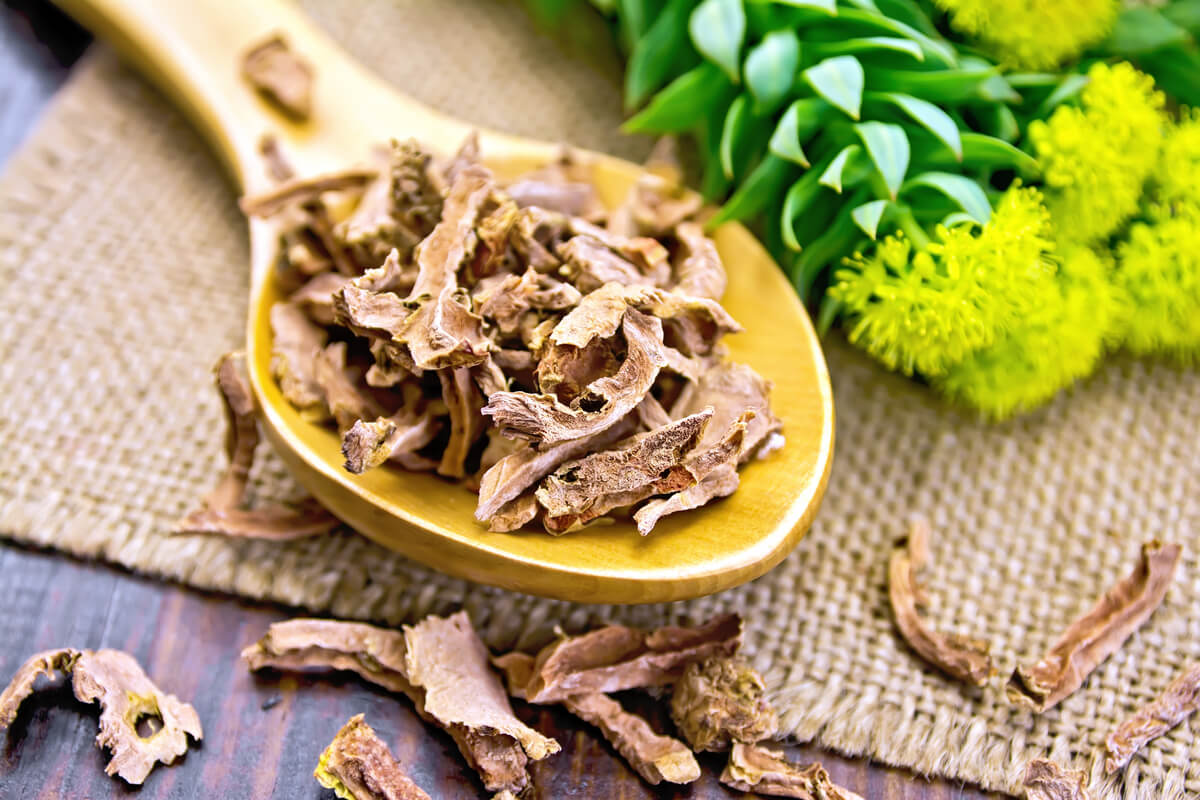Whether it’s a bad day at work or a set of misplaced keys, stress is an essential physical and emotional reaction that everyone experiences throughout life; however, long-term stress can negatively impact the brain and body, which can contribute to stress-related conditions, including accelerated aging, cancer, and depression. (2)(17)
Rhodiola rosea root extract has been found to contain more than 140 compounds, with many being naturally occurring phytochemicals (plant chemicals) that are thought to possess antioxidant and stress-resistant properties. (5) Classified as an adaptogen, rhodiola extract is reported to enhance stress tolerance and normalize the stress response despite exposure to stressors. (2)
What is Rhodiola rosea?
Rhodiola rosea (R. rosea) is a flowering, bushy succulent that is native to arctic and mountainous regions across Asia, Europe, and North America. (5) R. rosea root, also known as arctic root, golden root, and rosenroot, contains unique phytochemicals that may be responsible for its therapeutic benefits, including salidroside, a well-known adaptogenic sugar, and rosavins, a group of adaptogenic compounds unique to the plant. (5)(8)
The benefits of rhodiola are typically obtained through supplements. To purchase high-quality Rhodiola rosea extract, look for products with a standardized content of 1% salidroside and 3% rosavins, the naturally occurring ratio. (5)

Rhodiola rosea benefits
In order to prevent or limit the negative impact of stress, the body adapts to stress using a dynamic process referred to as stress resilience. Genetics, environmental factors, and exposure to previous stressors and trauma can impact an individual’s ability to resist the negative effects of stress. (17) Adaptogens, like R. rosea, enhance stress resilience, which decreases sensitivity to stressors and is protective against stress-induced cell damage and dysregulation. (10) Research indicates that these mechanisms may provide a variety of benefits, including cardioprotection, longevity, and neuroprotection.
1. Anti-stress
Stress is a physiological reaction to adverse circumstances that may trigger anger, frustration, nervousness, or trauma. (2)(15)(16) Stress can manifest physical and psychological symptoms, including exhaustion, headaches, and irritability. (2) When we’re stressed, hormones including adrenaline and cortisol are released, which trigger our fight or flight response. (15) This increases alertness, muscle tension, and heart rate. (15) When the body is exposed to excess stress, this constant state of tension can be draining, causing fatigue and difficulty focusing. (10) R. rosea extract may help mediate the stress response, promoting better adaptation and resilience to stressors.
In a clinical trial, stressed and fatigued night-shift physicians were given an R. rosea extract supplement or a placebo. Using the Fatigue Index, fatigue was assessed before and after each shift. During the first two-week period, a significant improvement in Fatigue Index reports were observed in the treatment group, suggesting R. rosea’s ability to attenuate general fatigue. (3)
2. Anti-aging
As we age, our organs and tissues naturally lose function and work less efficiently. (6) This makes aging a risk factor for many chronic diseases, including Alzheimer’s disease and cardiovascular disease. (4) According to animal studies, interventions to increase longevity can also delay or prevent many chronic diseases. (4)
R. rosea extract has also been shown to promote longevity in fruit flies, increasing maximum lifespan by up to 31%. (5) In organisms including fruit flies, worms, and yeast, R. rosea extract increased stress resistance and delayed age-related fatigue and decline of immune function. (5)
The exact mechanisms responsible for the anti-aging properties of R. rosea extract are largely unknown, as body composition, diet, and extract concentration impacted the efficacy of R. rosea in the reviewed studies. (5) As a result, further research, specifically in human subjects, is necessary to understand its anti-aging effects. (5)
3. Anti-cancer
Cancer is one of the leading causes of mortality worldwide. (9) Chemotherapy is the main treatment for cancer; however, chemotherapy can harm healthy tissues and may not always be effective. (18) These limitations have led researchers to explore alternatives, such as plant-derived therapies, which have been found to exhibit minimal side effects compared to other interventions. (18)
Research suggests that R. rosea and its bioactive components possess antitumor properties that may be effective against various cancers. In in vitro cancer cell cultures, salidroside exhibited antitumor effects by limiting cell propagation and inducing cell apoptosis, a sequence of events that lead to cell death. (5) Another study using mice also found that when combined with a pharmaceutical antitumor agent, R. rosea extract enhanced the effectiveness of treatment and reduced adverse effects. (5) Further research is required in order to understand whether R. rosea extract is an effective anti-tumor agent in humans.
4. Antidepressant
Excessive stress can contribute to the development of anxiety and depression. (14) External stressors are processed through sensory pathways in the central nervous system (CNS). These pathways play a critical role in the stress response and can become dysfunctional with exposure to chronic stress, which may lead to changes in behavior and mood. (14)
R. rosea has been found to possess antidepressant-like effects in animals, exhibiting regulation of dysfunctional stress response pathways. (1) In a clinical trial consisting of individuals with depression, supplementing with R. rosea extract significantly reduced Hamilton Depression Rating Scale scores, a widely used scale for depression assessment. (1) Though further research is necessary, these results suggest that R. rosea may possess antidepressant-like properties.
5. Anti-inflammatory
Research indicates that acute stress enhances immune function and limits generalized inflammation, while chronic or intense stress may contribute to overactivity of the immune system, leading to a pro-inflammatory response. (7) Excessive stress and inflammation has been implicated in the onset and progression of various chronic diseases, including Alzheimer’s disease and cardiovascular disease. (7) Research suggests that antioxidant-rich R. rosea root may be a beneficial anti-inflammatory agent for the following stress and age-related conditions. It’s important to note that while research suggests that R. rosea may be beneficial in these conditions, further clinical trials are needed to confirm these effects in humans.
Cardiovascular disease
Inflammation has been reported to play an important role in the development and progression of atherosclerosis, a condition characterized by fatty plaque deposits within the arteries. (13) These arteries can harden and become clogged, which can develop into heart disease. (13) Researchers have found that in mice, salidroside from R. rosea extract is a cardioprotective agent. Provided salidroside treatment for an eight-week period, mice with atherosclerosis experienced lower lipid levels and inflammation, which reduced plaque accumulation. (13)

Type 2 diabetes
The overproduction of various inflammatory molecules promotes insulin resistance, type 2 diabetes, and diabetes-related complications, including diabetic kidney disease (nephropathy) and eye disease (retinopathy). (11) This overproduction can be a result of various triggers, including aging, consuming a poor diet, having excess adipose (fat) tissue, and experiencing excess stress. (11) Researchers have found that treatment with pharmaceutical anti-inflammatory agents can improve insulin secretion and protect kidney and eye function in individuals with type 2 diabetes. (11)
This relationship is also being studied using natural alternatives, such as R. rosea. Studies in obese mice demonstrated that salidroside administration can significantly improve glucose and insulin tolerance and attenuate hyperglycemia (high blood sugar). (11) R. rosea extract may also be protective against the complications of diabetes. In diabetes-induced rats, treatment with rhodiola extract protected against early nephropathy by limiting the expression of a pro-inflammatory molecule found in the kidneys. (11)
Neurodegenerative disease
The development of neurodegenerative diseases, such as Alzheimer’s disease, multiple sclerosis, and Parkinson’s disease, is influenced by various factors; however, nerve damage is a main underlying cause of disease progression. (11) It’s reported that neuroinflammation is a significant contributor to nerve damage. (11) R. rosea may be an effective neuroprotective agent due to its anti-inflammatory properties. In rat models, salidroside treatment lessened cognitive impairment and neuroinflammation. (11) This evidence is also supported by in vitro studies showing that salidroside exhibits cell-protective effects by inhibiting certain inflammatory molecules. (11)
The bottom line
Rhodiola rosea has been widely studied in vitro and in animal studies; however, clinical research in humans is limited. The adaptogenic bioactive compounds in R. rosea extract may possess a wide array of antioxidant, anti-inflammatory, and anti-stress properties. Consider rhodiola if you are interested in focusing on healthy aging, experiencing a stressful time in your life, or have a stress-related condition. If you’re a patient, check with your practitioner before adding R. rosea to your regimen.
- Amsterdam, J. D., & Panossian, A. G. (2016). Rhodiola rosea L. as a putative botanical antidepressant. Phytomedicine: International Journal of Phytotherapy and Phytopharmacology, 23(7), 770–783.
- Anghelescu, I.-G., Edwards, D., Seifritz, E., & Kasper, S. (2018). Stress management and the role of Rhodiola rosea: A review. International Journal of Psychiatry in Clinical Practice, 22(4), 242–252.
- Darbinyan, V., Kteyan, A., Panossian, A., Gabrielian, E., Wikman, G., & Wagner, H. (2000). Rhodiola rosea in stress induced fatigue–a double blind cross-over study of a standardized extract SHR-5 with a repeated low-dose regimen on the mental performance of healthy physicians during night duty. Phytomedicine: International Journal of Phytotherapy and Phytopharmacology, 7(5), 365–371.
- Franceschi, C., Garagnani, P., Morsiani, C., Conte, M., Santoro, A., Grignolio, A., Monti, D., … & Salvioli, S. (2018). The continuum of aging and age-related diseases: Common mechanisms but different rates. Frontiers of Medicine, 5, 61.
- Li, Y., Pham, V., Bui, M., Song, L., Wu, C., Walia, A., Uchio, E., … & Zi, X. (2017). Rhodiola rosea L.: An herb with anti-stress, anti-aging, and immunostimulating properties for cancer chemoprevention. Current Pharmacology Reports, 3(6), 384–395.
- Liguori, I., Russo, G., Curcio, F., Bulli, G., Aran, L., Della-Morte, D., Gargiulo, G., … & Abete, P. (2018). Oxidative stress, aging, and diseases. Clinical Interventions in Aging, 13, 757–772.
- Liu, Y.-Z., Wang, Y.-X., & Jiang, C.-L. (2017). Inflammation: The common pathway of stress-related diseases. Frontiers in Human Neuroscience, 11, 316.
- Mao, J. J., Li, Q. S., Soeller, I., Xie, S. X., & Amsterdam, J. D. (2014). Rhodiola rosea therapy for major depressive disorder: A study protocol for a randomized, double-blind, placebo-controlled trial. Journal of Clinical Trials, 4, 170.
- National Cancer Institute. (2020). Cancer statistics. https://www.cancer.gov/about-cancer/understanding/statistics
- Panossian, A., & Wikman, G. (2010). Effects of adaptogens on the central nervous system and the molecular mechanisms associated with their stress-protective activity. Pharmaceuticals , 3(1), 188–224.
- Pu, W.-L., Zhang, M.-Y., Bai, R.-Y., Sun, L.-K., Li, W.-H., Yu, Y.-L., Zhang, Y., … & Li, T.-X. (2020). Anti-inflammatory effects of Rhodiola rosea L.: A review. Biomedicine & Pharmacotherapy, 121, 109552.
- Ray, A., Gulati, K., & An, R. (2016). Stress, adaptogens and their evaluation: An overview. Journal of Pharmacological Reports.
- Sun, S., Tuo, Q., Li, D., Wang, X., Li, X., Zhang, Y., Zhao, G., & Lin, F. (2020). Antioxidant effects of salidroside in the cardiovascular system. Evidence-Based Complementary and Alternative Medicine: eCAM, 2020, 9568647.
- Tafet, G. E., & Nemeroff, C. B. (2016). The links between stress and depression: Psychoneuroendocrinological, genetic, and environmental interactions. The Journal of Neuropsychiatry and Clinical Neurosciences, 28(2), 77–88.
- U.S. National Library of Medicine. (2020). Stress and your health. MedlinePlus. https://medlineplus.gov/ency/article/003211.htm
- U.S. National Library of Medicine. (2021). Stress. MedlinePlus; National Library of Medicine. https://medlineplus.gov/stress.html
- Wu, G., Feder, A., Cohen, H., Kim, J. J., Calderon, S., Charney, D. S., & Mathé, A. A. (2013). Understanding resilience. Frontiers in Behavioral Neuroscience, 7, 10.
- Zhao, G., Shi, A., Fan, Z., & Du, Y. (2015). Salidroside inhibits the growth of human breast cancer in vitro and in vivo. Oncology Reports, 33(5), 2553–2560.





